Future of E ducation Technology







Technology professionals are being urged to upskill in the fight against ever-increasing cybersecurity attacks that rapid digitalisation has brought along with a widening skills gap.


In a world where cyberattacks are on a constant rise, with one occurring every minute, industries and organisations must take protective measures now.
The need for Information Computer and Technology (ICT) professionals with cybersecurity skills is more urgent than ever as the speed of digitalisation has led to an ever-widening skills gap across the globe.
In turn, this has opened up a huge number of job opportunities and enhancements for those seeking careers in the field of cybersecurity — or indeed those already working in ICT and looking to upskill or re-skill.
In the 2022 Cybersecurity Workforce Study, it was found that 3.4 million more skilled cybersecurity professionals are currently needed globally. Moreover, the Organisation for Economic Cooperation and Development (OECD) estimates ongoing technological advances will radically transform 1 billion jobs in the coming decade.
According to Cyber Skills, Ireland’s leading experts on cyber security education, the country currently has a ‘critical shortage of cybersecurity professionals, which is placing its digital economy at risk.’
The initiative, funded by Ireland’s Higher Education Authority (HEA), is a collaboration between three of Ireland’s top universities — Munster Technological University, University of Limerick and Technological University Dublin — which are providing job role-specific pathways and micro-credentials to address the skills shortages in the area of cybersecurity.
@BusinessnewsIE
Flexible courses for upskilling and re-skilling
Jacqueline Kehoe, project manager at Cyber Skills, says: “We are offering a wide range of flexible, online courses to enable people already in the workforce to upskill or re-skill themselves.

“We have designed these courses together with our industry partners for specific job roles. Currently, we are seeing the biggest gap in secure network operations, software development and systems architects.”
Participants can gain Special Purpose Certificates or micro-credentials — smaller, academic credits — all accredited by the universities through online courses. “They can take a single subject micro-credential or study up to four modules for a pathway. It’s up to the individual how they want to achieve the qualifications,” Kehoe says.
A cybersecurity academy has also been established to encourage interest and raise awareness of security careers through technical training aimed at young people aged between 16 and 18. “It’s important to understand how cybersecurity affects us all and how much safer we can make our digital lives if we train and upskill,” concludes Kehoe.
Claire McGee Head of Education and Innovation Policy, IbecSince the turn of the century, the way we work, communicate, do business and access information has fundamentally changed. Change at the enterprise level is accelerating by investment in technologies.
Successful implementation of technologies — such as cloud and cognitive computing, AI and machine learning — rests with capable people with the necessary skills and abilities to ensure business transformation.
Workplace disruption is ongoing
While some organisations are more open and ready for digitalisation, this is now a constant challenge for all businesses across all industries. At the same time, we need new skills to adapt to climate change and support the transition to a low-carbon economy.
The education and skills needs of the economy are highly complex and evolve rapidly.
The landscape of the education system is also evolving, providing pressure and the rationale for system-wide transformation and reconfiguration. Higher education and furthereducation and training institutions are now required to respond to the rapidly changing skills needs of industries and to reflect the more dynamic economy and society in which we live and work.
The education system will need to consider the relevance of conventional learning pathways to gain qualifications and how to incorporate informal and non-formal approaches to learning; how to engage learners, business, partners and collaborators in the design of
learning and research programmes; address the imperative of lifelong learning; how to accommodate the needs of a new student profile and demographic to also include adult learners, career returners and changers; and respond to the changing pattern of study.
A seismic shift is needed in the relationship between Irish universities and further education colleges to be successful in this endeavour.
Bidirectional approach to talent and innovation development
Education institutions should rethink their programmes with greater levels of enterprise engagement. Embedding real-world enterprise challenges within programmes and linking students with mentors to work on specific in-house projects could be game-changing.
For instance, universities can provide excellent test beds and extended workbench facilities to companies and link in academic expertise and brain power to work on common issues. This can make the research and technology centre network more accessible to a broader range of enterprises and students.
Talented people, the availability of key skills and the ability to connect easily with universities are real positive features of Ireland’s competitive offering. Let’s keep disrupting, learning and innovating together.
All images supplied by Gettyimages, unless otherwise specified
Ongoing technological advances will radically transform 1 billion jobs in the coming decade.
Micro-credentials are short, sharp, flexible courses that allow individuals to engage with lifelong learning while they are working. They’re the perfect way to upskill.
In Ireland, there is fierce competition for talent. Every big company in Ireland is fighting for the same cohort of graduates and the same experienced workers. So smaller firms must be able to unlock the potential of their workforce to fill the skills gaps they face. If they don’t, it will hinder their capacity to grow,” explains Dr Emma Francis, MicroCreds Project Officer at the Irish Universities Association.
 Mark Gantly Chair, West Regional Skills Forum
Mark Gantly Chair, West Regional Skills Forum
On the face of it, Ireland doesn’t lack trained and skilled workers. After all, it has a reputation as one of the most productive countries in the world, notes Mark Gantly, Chair of the West Regional Skills Forum, a government-sponsored forum that aims to improve engagement between enterprise and the education and training sector. “But look behind that headline, and you’ll notice that multinationals play a big part in driving those impressive productivity numbers,” he says. “Meanwhile, Ireland’s small and medium enterprises (SMEs) are struggling to catch up.”
WRITTEN BY Tony GreenwayWorkforce dilemmas micro-credentials can help with Multinationals find it easier to invest in the education and training of their people — whereas small and medium-sized companies may not. For one thing, it can cost a substantial amount for an SME to release a team member to, say, study a post-graduate degree for months. It also makes a dent in productivity because — who covers for that employee while they’re away?
Ironically, those same small and medium enterprises urgently need to reskill and upskill their staff if they are to deal with any challenges coming down the track. “Companies of every size are being impacted by the pace of digital transformation and achieving Zero Carbon targets,” explains Dr Francis.

Micro-credentials are an important part of the solution. These university-delivered programmes can be accessed in multiple ways (in person, online or hybrid) over a relatively short period of time, and a diverse range of cross-sector topics are available.
“Micro-credentials are a short, sharp and flexible way for individuals to engage with lifelong learning,” says Dr Francis. “They’re much more time-effective and cost-effective than a traditional course, which makes them a suitable option for anyone in the workforce who is looking to upskill to
develop their professional career pathways. They’re also suitable for anyone who is between roles or looking for a new opportunity or promotion.”
Micro-credentials are also a benefit from an employer’s perspective because leaner, more targeted, enterprise-led courses give staff the specific knowledge, skills and competencies they need to thrive in their roles.
Building confidence and making learning a habit
“Micro-credentials tick a number of boxes,” says Gantly. “They offer quality education and training in a granular form that is more digestible — and, importantly, accredited. If people haven’t experienced education for a while, taking a shorter course can help build their confidence and make regular learning habit-forming.” That’s essential as continuous learning is becoming increasingly necessary.
It’s not always easy for people to engage with micro-credentials because information about these types of courses has been fragmented. Now, however, a flexible learning project led by the Irish Universities Association (IUA) in partnership with seven of the founding IUA universities: University College Dublin, University College Cork, University of Limerick, Trinity College Dublin, Dublin City University, University of Galway and Maynooth University aims to address this.
The new MicroCreds.ie platform, which launched in April 2023, aims to promote greater awareness of micro-credentials as a valuable form of upskilling and lifelong learning in Ireland for both individual learners and enterprise.
Going forward, SMEs will have to upskill and reskill staff to stay relevant and remain competitive. “Firms need to future-proof their workforce by equipping them with different skills,” says Dr Francis. “Micro-credentials are an effective way to do that.”

Why micro-credentials are a quick and easy way to learn
Micro-credentials are a short, sharp and flexible way for individuals to engage with lifelong learning.Dr Emma Francis MicroCreds Project Officer, Irish Universities Association
A one-stop shop offering networking opportunities and wide-ranging upskilling services to leaders within the nonprofit sector is seeking partnerships with other providers.
The Leadership Academy supports leaders in the nonprofit sector to enhance and refine their skills by giving them access to educational resources and networking opportunities.
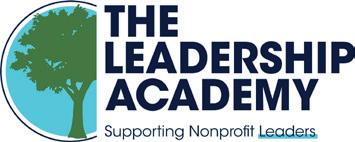
According to Sharon Hughes, the Manager of The Leadership Academy, the goal is to create “the most helpful website in Ireland.” She wants to ensure that people can easily find courses, coaches, and mentors, and determine their competency levels with just a few clicks — whatever level they are on their leadership journeys. The resource is being developed by The Wheel — Ireland’s national association of charities, community groups, and social enterprises.
On the website, individuals can begin by taking a Leadership Competency Assessment to identify which aspects of their personal growth they may need to concentrate on.
If, for example, after the assessment, someone finds they need to brush up on their communication skills, they can tap into the resource library to find readily available tools — from courses to books and podcasts.
The Leadership Academy is also seeking to collaborate with more upskilling providers following the success of their pilot scheme with UCD Professional Academy. Through this partnership, Leadership Academy users can avail of a substantial discount on over 40 courses offered by the UCD Professional Academy.
“We found that people weren’t just opting for the leadership courses,” says Hughes. “One person wanted to do a data analytics course because it would help their charity raise its game while enabling them to apply for a promotion in the future. This is an excellent example of upskilling being a win-win for both individuals and organisations.”
A leadership directory is also being developed to bring together services from business coaches, mentors, psychologists, health and wellbeing specialists and more.
“As well as functional and technical upskilling, there are plenty of holistic options for leaders, such as mindfulness and emotional agility training to improve leadership skills — and we are open to it all,” adds Hughes.
With the demand for digital skills, businesses need tech-savvy graduates to fill in roles that may have not even existed when they were in school.
Technological advances and the rate at which the world of work changes are ever-increasing. Outlined here are five digital skills that make graduates more employable:
Social media as a valuable digital skill
Modern-day businesses build dynamic relationships with their target audience through social media. From building a brand to driving traffic to your website and providing customer service, social media can add value to businesses.
Data analytics for better decision-making
Investing time, money and effort into an online presence is a necessity. Data can help businesses focus efforts where they matter and make informed decisions. A graduate with data analytics skills will have a distinct advantage when applying for jobs such as data analysis, data processing and many others.
Mobile marketing for quality content

With smartphone traffic exceeding desktop traffic, mobile-friendly content has an advantage in the battle for consumer attention. Strong knowledge of mobilefriendly marketing is bound to stand out.
Video content to engage audiences
Video is the most popular form of digital content. It’s the best way to attract and retain the attention of your target audience. Video is easy to consume as it requires little to no effort from the user and is therefore highly engaging. Having the skills to produce quality video content will help graduates stand out to companies that understand its value.
Artificial intelligence to streamline processes
AI can simplify certain tasks and reduce labour-intensive or repetitive ones. Knowing how to make use of AI tools and keeping up to date with technology will make graduates better equipped for the modern workplace. A partnership of public and private organisations is developing a national skills platform to narrow Ireland’s digital skills gap. According to Minister for Further and Higher Education, Research, Innovation and Science — Simon Harris TD: “As a knowledge-based economy, the development of digital and data skills is of huge strategic importance for the country as all sectors nationally and locally prepare for digital transformation and a new age of skills requirements.”
Claire Farrugia Assistant Editor, gradIreland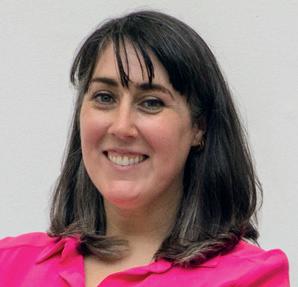
Over numerous tendered framework agreements, Snap has demonstrated its expertise in contract management, particularly within the educational sector. Our track record speaks for itself when it comes to delivering exceptional products and services to educational clients.
The Snap brand has become synonymous with the Irish business community, with nearly 40 years of experience and 16 centres across Ireland. We have established ourselves as the go-to partner for companies seeking to promote their brand.
Providing tailored marketing solutions
With our extensive network, we are able to identify changing trends within the business community and respond with a range of tailored marketing solutions. This hands-on approach has transformed Snap Ireland from a traditional print-only company into a onestop provider of graphic design, high-impact print, signage, promotional products, website development and video production. We are not just printers; we are partners in your success.
Certified to deliver your needs
At Snap, we understand the value of our network. It is the foundation of our business, combining years of expertise and knowledge from everyone within the organisation. We uphold high standards for our franchisees, ensuring they meet and exceed customer expectations. As an ISO 9001:2015 certified organisation, Snap takes pride in the quality and integrity of our system. This certification demonstrates our ability to consistently deliver products and services that meet customer and regulatory requirements.
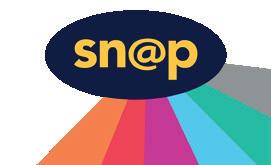
Guarantees and prioritises
• An experienced and operationally excellent team that draws on the right expertise to exceed account service objectives and quality
• Benchmarking of service against existing delivery and continuous improvement through regular reporting and communication
• A scalable and flexible model to accommodate varying demands
• A cost-effective service with transparent pricing
• Collaborative partnership to deliver an optimum service
At Snap, customer relationships are paramount. We prioritise fostering strong connections day in and day out. Placing the client’s needs at the centre of everything we do is one of the pillars of our successful business.
Natasha Rahman Group Marketing Manager, Snap

How nonprofit leaders can enhance their competencies and access upskilling resources
The integration of teaching tools, such as VR/AR, in enhanced learning is revolutionising education technology.
The development of virtual reality (VR) and augmented reality (AR) provides immense potential for SMEs in their digital transformation journey as graduates will already have experienced many of the relevant technologies during their studies.
VR and AR as digital teaching tools
One example is the Microsoft HoloLens AR headset being used in industry to create production and maintenance guides that enable operators to perform rare, complex or specialised tasks with hands-free operation.
In engineering programmes at Atlantic Technological University (ATU), lecturers are availing of training funded by the Advance Centre to incorporate AR headsets as a teaching tool to develop user guides for laboratory equipment, work collaboratively and create relevant use cases.
Identifying learning needs
In UCD, Technology Enhanced Learning (TEL) is used as a comprehensive term that supports a range of learning delivery modes such as blended, web-enhanced, fully online and face-to-face learning. TEL consultations offer an opportunity for faculty to discuss teaching needs and challenges while seeking to provide support to identify appropriate TEL solutions. This approach is aligned with the UCD Strategy for Education and Student Success 2020–2024 to embed technology-enhanced learning in ways that are educationally appropriate, programme-focused, accessible, innovative and impactful.
A series of skills initiatives are providing signposted pathways to the wealth of career and job opportunities currently available in the growing Irish film industry.
It’s no secret that the Irish screen industry is riding high with a record number of Oscar nominations this year for films such as An Cailín Ciúin and The Banshees of Inisherin
Learner-focused teaching tools
Many trends are impacting learning design, such as personalised and social learning, micro-learning and gamification. Technology trends are also changing, such as AR and VR, mobile learning and learning analytics.
The Advance Centre’s approach to digital learning further develops the range of support modules available through Brightspace Virtual Learning Environment (VLE) in UCD and Moodle in ATU. Activities include developing a flexible approach to ensure that all students can participate fully; provision of captions for video content and provision of live and recorded sessions.
The Centre supports the development of inclusive information technology systems and infrastructure, which incorporate the principles of Universal Design — ensuring that they can be readily accessed, understood and used independently. By taking up a course with the Advance Centre, professional learners will have access to world-renowned academic staff, gain accredited qualifications and enjoy a transformational learning experience.
 Mary Anne Culhane Educational Technologist, Advance Centre UCD
WRITTEN BY Sheree Hanna
Mary Anne Culhane Educational Technologist, Advance Centre UCD
WRITTEN BY Sheree Hanna
The sector has doubled in size in the past decade and is estimated to be worth over €692 million, comprising 11,960 jobs by way of direct, indirect and induced employment across the economy.
With that has come a wealth of career and job opportunities across a huge range of roles within the screen industries. Fís Eireann/Screen Ireland, the development agency for the Irish film, television and animation industry, is leading the way to bridge the skills gap fuelled by that rapid growth.

Accessible film industry training pathways
Andrew Byrne, Head of Television, says: “It’s about continuing that trajectory of opportunity around traditional storytelling while looking at new avenues, for example, within animation and documentary as an opportunity for the future.”
Louise Ryan, Head of Marketing and Communications, says: “Ensuring we have a wide range of skills opportunities is key to supporting local filmmakers producing Irish stories on screen, while ensuring that we have a wide crew base to supply international film, television and animation projects coming to Ireland. The evolution of the industry’s array of new skills, taking into account VFX and gaming, means we have to take a 360 approach in terms of training opportunity access.”
The agency works closely with industry guilds representatives, including crew, writers, directors and producers, to provide an analysis of the skills gaps. Ryan says: “We have worked collaboratively with both industry and third-level institutions to meet priority skills needs, and this has produced positive results.”

Screen Ireland now has TU Dublin accreditations for both its Advanced Producing and Passport to Production courses. They also collaborated with University College Cork (UCC) on the prestigious Puttnam Scholars initiative and a first-of-its-kind Neurodiversity in the Screen Industry programme.
Last year, Screen Ireland also launched five National Talent Academies established across the country, aiming to find emerging and diverse talent to enter the industry.
The skills requirement around the Section 481 tax credit also means every project with a budget over €2 million has to submit a skills development plan. It ensures starters, trainees and established employees have structured workbased learning on production.
Yvonne Sarsfield Instructional Designer, Advance Centre, ATU Sligo

Byrne concludes: “Innovation is key to us. We have set up a fund to continuously support that, and we are working closely with the gaming industry, which is fast becoming a significant area in terms of development and investment for Ireland.”

Edtech designs learning experiences around learning styles and concepts, which creates a more meaningful experience for the learner.
Digitalisation has the power to enact real change that will pave the way for a diverse, equitable and inclusive education system in the EU.
This 2023, the European Year of Skills, aims to address skills shortages in the European Union (EU) and boost the EU skills strategy, which will help reskill 6 million people and focus on digital and green technology skills.
Helping educators keep up with digital education
With recent radical innovations and rapid accelerations in digital education, we must now ensure the digital momentum continues. Key to creating a digitally competent talent pipeline is ensuring that the educators are confident, briefed and adaptable to new technologies and methods of teaching.
During the Covid-19 pandemic, we saw a rushed transition to online learning, but more importantly — teaching. It highlighted the resilience of teachers and their ability to support new methods of teaching. While we believe digital teaching cannot replace classroom teaching, we need a radical transformation from the theoretical era to the digital era where online learning can supplement and complement — but not replace — the offline direct teaching–learning process.
Tools promoting digital education across the EU
At an EU level, a new initiative ‘SELFIEforTEACHERS’ has been developed together with a panel of education experts from across Europe. It is an online tool to help primary and secondary teachers reflect on how they are using digital technologies in their professional practice.
Technological progress is accelerating. For instance, ChatGPT recently launched four new releases in just four months. Governments and businesses must rethink training and entrepreneurship education to keep pace.
Educators can use the tool to learn more about the digital skills they have and identify areas where they can develop further. The toolkit will identify an educator’s digital competence and can guide them by showing how they are using digital technologies in their practice and how they can support students’ digital skills.
Key developments in Ireland across the Junior and Senior Cycles — including the introduction of the Leaving Certificate Computer Science programme — have been welcomed. To facilitate the rollout of this course, educators need opportunities to acquire and enhance their knowledge, skills and attitudes to support the learning of STEM subjects.
Many European and international studies have highlighted the importance of strengthening teacher competencies in STEM subjects. For example, teachers’ professional development combined with in-school evaluation and co-teaching have shown positive results for the schools using these methods.
Industry can play an important role in facilitating teacher training through placement opportunities, co-teaching and opportunities to understand various skills needs. Technology Ireland and its members aim to support educators and empower them to lead the future of education.

For more information, visit ibec.ie/technologyireland
When I first visited ECOLE 42, I noticed a student dressed up in a rainbow unicorn costume while coding. My curiosity was piqued. I asked the young entrepreneur what he was doing at this tuition-free private school. It turns out he was in the ‘swimming pool’ trying to get admitted to what is now one of the most important sources of tech talent in France and has been replicated in Canada, Colombia, Malaysia and Spain.
Fostering entrepreneurial skills fit for the future ECOLE 42 selects candidates mostly based on their transversal skills. It’s not a requirement to know code. Being passionate, creative, resilient and accountable is what matters. The curriculum looks like a game of role-play in which students work together to solve challenges, learning from each other in the process. At ECOLE 42, there are no formal lessons or teachers. To weather the three-year programme, one needs a flair for problem-solving, teamwork and ‘learning by doing’ in the digital arena. These are precisely the skills needed to boost innovation and entrepreneurship.
A worrying skills landscape is emerging
Chris Miller writes in ‘Chip War’ (2022): “Silicon Valley wouldn’t exist without the entrepreneurs who built it.” But skills gaps, including in digital technologies, are still staggeringly high in OECD countries. On average, more than 10% of the workforce aged 16–65 lack basic skills. Even in the United States and South Korea — countries with a strong digital backbone — only 25% have a ‘well-rounded skill set.’
Data suggests that there are too few opportunities to develop these transversal skills. While elite students often succeed in competitive selection processes or pay high tuition fees to higher education institutions using innovative learning styles and new technologies, others — particularly those from disadvantaged backgrounds — risk getting frozen out of the future.
The time is ripe for governments and businesses to develop radical, new approaches to education and training systems that embed entrepreneurial and digital skills throughout the curriculum. We must give young people the skills to succeed.
For more on Entrepreneurship Education at the OECD, visit oecd.org/cfe/ smes/eecole.
The new OECD network called Entrepreneurship Education Collaboration and Engagement (EECOLE) supports the piloting and assessment of new practices. It is a small step but could give the new skills mix the boost it needs.

GivingO’Keefe Technology Ireland Executive and Vice Chair of Digital Skills working group of Digital Europe Raffaele Trapasso Senior Economist, OECD Centre for Entrepreneurship, SMEs, Regions and Cities

Forging meaningful connections between businesses in Ireland and educational institutions helps address critical industry needs, develop purposeful networks and boost competitiveness.
Digitalisation has enabled Higher Education Institutions (HEI) to make huge strides in the development and delivery of relevant higher education, states Professor Lisa Looney, Vice President for Academic Affairs and Registrar of Dublin City University (DCU).

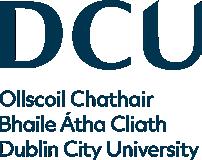

“By leveraging digital advancements, we are transforming many aspects of the student experience, such as enhanced collaboration in courses between academic experts and students; providing flexible learning opportunities; access to industry-informed and digitally enhanced learning resources,” she says.
Short courses powered by the latest technologies

All students and learners — from full-time students to part-time and post-experience learners — can engage in a suite of micro-credentials or short courses. “We are supporting students to connect with their peers, collaborate and create networks while learning. We utilise some of the latest technologies, such as augmented and virtual reality, to provide dynamic and professional learning experiences,” explains Professor Looney.
Modern education to fill digital skills gaps
DigiAdvance is an EU-funded project, under the Digital Europe Programme. Led by DCU, it brings together three HEIs from the European Consortium and three industry partners from Ireland, Spain and Portugal.
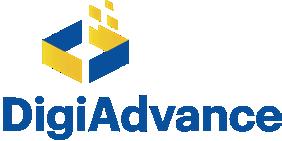
Professor Looney says: “We aim to provide industry-informed and academically sound short courses to bridge the digital skills gaps for SMEs. We will ensure they have the necessary digital skills to compete in their sectors.”
Hilary Moran, Chief Operations Officer at The FinTech Corridor believes that fruitful partnerships that bridge the gap between industry and academia can address the skills gap. “Creating that collaborative environment is hugely important to develop a highly skilled workforce, grow a business and improve employability,” she says.
As a partner of DigiAdvance, the FinTech Corridor provides opportunities for upskilling and reskilling in the fintech sector, creating a win-win situation for both employees looking to advance their careers and companies seeking to fill skill gaps.
Courses will align with industry needs in the areas
of fintech, machine learning, blockchain, website and mobile app development and cybersecurity. “We are doing a deep dive into finding out what is really needed by industry and SMEs — not what we think they need,” says Professor Looney. “Short courses will also reflect local and professional realities for SMEs. For instance, by being delivered in local languages — English, Spanish and Portuguese — to facilitate participation.”
To develop new skills, courses must be accessible and flexible. “There’s been a huge uptake on microcredentials,” adds Moran. “It allows students to test the waters and saves employers from having to allocate years to long-term courses. We’ve seen great success with our 12-week courses.”
Soft skills combined with reskilling
Alongside digital skills, soft skills are essential for success in any digital transformation, argues Jordi Arrufí, Director of Digital Talent Programme at Mobile World Capital Barcelona (MWCapital) — a DigiAdvance industry partner. “Soft skills have been identified as priorities for reskilling,” says Arrufí.

According to the World Economic Forum, soft skills required include analytical thinking, creative thinking, leadership and social influence, programming and technological literacy. MWCapital is a publicprivate institution with a learning platform aiming to boost market competitiveness to address the digital skills gap by attracting new professionals to the market.
“Reskilling promotes a culture of lifelong learning and curiosity to keep up with the rapid pace of technological change, both in society and within companies,” explains Arrufí. “Our role is to act as a market catalyst by weaving alliances with various organisations that make it possible to generate innovation and position Barcelona as a reference city on a digital level,” he adds.
With these programmes and short courses dedicated to reskilling and upskilling, industry and academia can help develop the skills needed for digital growth. “DigiAdvance members are leveraging our combined expertise of pedagogy, discipline expertise, technological innovation and industry know-how to provide digitally enhanced, bespoke short-form learning to the highest standards,” concludes Professor Looney.
Courses will align with industry needs in the areas of fintech, machine learning, blockchain, website and mobile app development and cybersecurity.Hilary Moran Chief Operations Officer, The FinTech Corridor Jordi Arrufí Director of Digital Talent Programme, Fundació Mobile World Capital Foundation (MWCapital) WRITTEN BY Sarah Brown Mary Cleary Secretary General, Irish Computer Society
The need for skilled IT graduates and practitioners will Increase as more organisations accelerate their adoption of digital processes such as migration to the cloud and third-party outsourcing.
Organisations need skilled and agile IT professionals as their strategic technology partners to implement digital changes. With the increase in cyberattacks since 2020, demand is up for roles in cybersecurity and other specialist IT roles.
Despite the increasingly important role of computer science graduates across all sectors, there is a troubling gap in statutory investment in third-level computer science courses compared to engineering and other lab-based disciplines.
Professor Tiziana Margaria, ICS council member and fellow, and professor of computer science at the University of Limerick, explains: “There is an unjustified funding gap between the software engineering and computer science education and the computer engineering disciplines. Computer science is an experimental science that takes place primarily in projects in labs, similar to computer engineering.

“Third-level institutions are training students in computer sciences and software engineering — essential to the progression of our society. The systematic underfunding of computer science — one the most prominent tech professions in the country — is not reflective of where the discipline is today.’’
Culture of IT professionalism
IT and digital professionals help society tackle its shared goals and challenges, so we must build an Irish IT profession that is recognised and trusted by other stakeholders. Professionalism is a key concern for IT professionals globally. Standards of competence, knowledge and ethics are now demanded as evidence of the high levels of quality assurance and competence of those working in IT.
IT Professionalism Europe (ITPE) is a network of leading stakeholders committed to the implementation of those standards, developed by CEN/TC428, and the advancement of IT professionalism in Europe. The Irish Computer Society (ICS) has high-level involvement in both ITPE and CEN/TC428. The European Commission’s Digital Decade ambition of having 20 million IT professionals in Europe by 2030 will be enhanced by the work and advocacy of ITPE and the ICS.
Digital skills are essential for all Third-level and advanced digital skills are the bedrock of IT professionalism — critical to the success of the European economy and society. Everyone should have the opportunity and access to develop strong digital skills. A digitally competent workforce means a larger pool of talent for future IT professionals. Not every student will go on to become an IT professional, but having the chance to build key ICT skills and competencies can open the door to more opportunities and flexibility.
Paul Crone Director National Association for Principals & Deputy Principals
Increasingly, to attract students, schools have embraced the use of technology as a learning tool. However, schools must find the right balance that works for students and school processes.
Moving from primary school to secondary school is a milestone in every child’s life and is also a source of stress and anxiety for every parent. The need to pick the ‘right’ school can be an all-consuming process for parents. For parents this process can be all consuming.
Increasingly, in order to attract students, schools have embraced to use of technology as a learning tool. Schools are beginning to describe themselves as a “Tradigital” school. This is a school that builds on traditional teaching methodologies and embraces the best technological advances to support learning. This option is appealing to parents and students alike, as the future of young adults will undoubtedly involve the use of technology in their working life and personal life.
When a child starts post-primary school, there is an increased focus on assessment. The exams, their results and their academic performance start to take precedence over enjoyment and the experience of learning. However, recent technological developments have created serious concerns around assessment and certification.
The recent launch of the artificial intelligence (AI) platform ChatGPT
has called into question the integrity of project work, research projects and work pre-prepared for assessment. Having embraced technology as an integral part of our classroom, have things now moved on too far to be able to use the technology for assessment and certification purposes?
Thinking back to when the mobile phone became an essential accessory for every student and no matter how hard schools and parents tried, it became clear that mobile phones were here to stay. The optimum decision for schools has been to embrace mobile phones and teach responsible use, underpinned by the core values of respect, responsibility and honesty. Our response to the use of AI lies in our experience with mobile phones.
Embracing AI to empower students
One question for us concerning assessment and certification is: CAN we embrace AI, teach responsible use and adjust our assessment practices to maintain the integrity of our exam process? However, we note that the genie is already out of the bottle, so the question must be, HOW can we do this? We must also discover this ‘HOW’ quickly to continue to empower students for their future challenges.
Rather than asking students to ‘fit in,’ we must discover what makes them unique and unlock the talents within them. This is what a supported training provider prides itself on — curating each student’s education.
National Learning Network (NLN) offers supported, flexible training courses across Ireland. Thousands of people have completed them with the confidence and the encouragement to pursue their goals, get a job or progress to further education — making an impact for themselves and others.
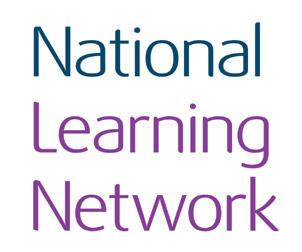
Culture of inclusive education
We work with people aged 16 to 65 with additional learning requirements. This includes people with a physical, sensory or learning disability; mental health challenges, such as a social phobia or anxiety; people with autism; people recovering from an illness, accident or injury.

The local Education and Training Boards, or the HSE, fully fund all courses. Our specialised staff include psychologists, resource staff, advocacy officers and instructors trained in the delivery of personalised support. For us, no one should be left behind. To create genuinely inclusive education, our teams look towards innovation in technology through diverse means.
First-class student experience
We embrace technology to ensure total equity of access and that all students’ needs are met. Alongside personalised support within the classroom, our virtual learning environment, eNLN, offers nearly 100 courses on various subjects.
Adopting technology-enhanced learning creates an environment where students can engage with their learning by creating their own podcasts, videos, safe social networking sites and more.

We have made significant progress with designing and developing programmes in adherence to the principles of Universal Design for Learning (UDL). By embedding UDL into our courses through accessible technology and engagement with multimedia, students with disabilities have the autonomy and support to pursue learning that works for them.
Prioritising student needs
‘Cubbies’ have become a popular addition to many centres; these personalised sensory pods are an easy-to-use, immersive personal space of sound and vision, particularly beneficial to neuro-diverse students.
We have also recently taken delivery of ‘Dream to Drive’ simulators, which offer virtual driver development programmes to help students obtain a driver’s license in a safe, stress-free learning environment tailored to the student’s needs.
Flexibility ensures success
Students are given the time and support to work at their own pace. They can begin a course at a time that suits them, ensuring there is no onus on them to ‘keep up’ with the rest of the class. We believe strongly in providing holistic support for students. Building confidence, while making friends and being active participants in their local community, is vital to the NLN student experience.
Read on page 10 - page 12
The Covid-19 pandemic reshaped the world in which we live and work. We have seen workplaces transform, facilitated by digitisation and social change, as people sought more flexible and hybrid working patterns.
As a business that has embraced this thinking, our hybrid work model at Bluestone Motor Finance has seen us emerge as a multi-awardwinning organisation. We leverage our digitisation programme which enables our highly regarded team to deliver our service to every client.
For us, hybrid working is not just our team coming into our office for a limited number of days each week; it is about how we combine technology and people to assist our customers to achieve good financial outcomes.
At Bluestone, we operate across the credit curve in providing motor finance. Frequently, we choose to help people that other lenders may have declined by working to understand them and their capacity to fulfil a financial commitment by going beyond simple credit scoring.

We help people with an established credit history; those who have been refused finance in the past or have a complex or limited credit history; self-employed; and SMEs. People with these profiles are all around us.

In today’s 24/7, flexible, hybrid environment, we recognise the need to be flexible to meet the significant change in working patterns. For example, people increasingly work outside of the traditional nine-to-five. Commuting by public transport out of hours may not be possible, or people may feel unsafe walking alone or at night.
A car is not just about the freedom I craved as a young man; it is about safety and certainty. For those familiar with Maslow’s Hierarchy of Needs, it equates to fulfilling the need for security and safety.
The reality for many businesses is that if we, at Bluestone, can go the extra mile to help one of their team to commute safely by financing their car, we are helping to future-proof their employment, sustaining their ability to get to work. We can also enable the flexibility many require to combine increasingly hectic social and working lives and personal commitments.
Donal Murphy MD, Bluestone Motor Finance
Wellbeing and wellness are often used interchangeably. However, when we look at their real meaning in the context of the workplace, there are nuances at play. Both may be relevant, but we should consider many interdependent factors when designing an employee wellbeing strategy.
Adopting a holistic view of wellbeing
The concept of wellness can be more simply defined as ‘the active pursuit of activities, choices and lifestyles that lead to a state of holistic health.’ Typically, when we think about wellness, or ‘living well,’ we think about looking after our own physical health to feel good and prevent disease.
When we look at wellbeing in its broadest sense, the scope expands to encompass a range of drivers that can positively or negatively impact our experience and satisfaction with life and, ultimately, our physical health and performance. Considering these individual aspects can help us to form a holistic view of how a person’s wellbeing is shaped by the many complexities of life. A good example of a holistic view is Gallup’s ‘five elements of wellbeing that add up to a thriving life,’ citing:
• Career wellbeing
• Social wellbeing
• Financial wellbeing
• Physical wellbeing
• Community wellbeing
What does this mean for the workplace?
More businesses are beginning to see employee health and wellbeing as a key performance
indicator for overall business sustainability and success. However, to maximise this opportunity, it is essential to evolve how we resource and strategise on employee wellbeing.
If we can approach the design of holistic wellbeing strategies both strategically and with compassion, seeking to look at the root cause of why people are disconnected or disengaged, we can get closer to a mature understanding of the state of our workforce and what needs to be done to enable people to thrive.
This may look different depending on the type of business. A key strand is ensuring there is shared ownership for wellbeing. This begins with senior leadership and trickles down through relevant disciplines, line managers, employee groups, etc.
Another important strand is data. Businesses should drill into every available data source to understand the challenges facing their workforce across key wellbeing drivers. There may be gaps to fill, but it is a great place to start.
In Ibec, we are enabling organisations to think strategically about wellbeing through our structured KeepWell programme, our Ibec Academy of management training and our specialised HR strategy services.
Sophie Moran KeepWell Programme Manager, Ibec
A clearer understanding of wellbeing in the workplace can guide the development of a sustainable strategy.
What do we really mean when we talk about workplace wellbeing?
Businesses should drill into every available data source to understand the challenges facing their workforce across key wellbeing drivers.
Businesses and employees are increasingly using upskilling programmes to ensure they have the right skill set to compete in an ever-evolving work environment.
Many of the 270,000 companies in Ireland are facing change at a rapid pace. While some of its workforce is highly educated, a total of 43% (CSO, Q3 2019) have only studied up to their Leaving Certificate. In addition, there has been a reluctance by companies to engage in Further Education and Training (FET), an area in which Ireland has lagged behind many other European countries.
Upskilling and reskilling to plug adult learning gap
However, since the start of the Covid-19 pandemic, which saw an overnight transition to hybrid or remote working for many, there has been a huge upsurge in reskilling (learning skills for a potentially different career) and upskilling (developing skills in an existing role). This has included IT skills, developing online marketing techniques and management skills.
Collaborating with education and training boards
At certain stages in life, employees might want the flexibility of blended or online learning. It is low-risk and an easy way to try new things. Meeting this need is ‘Skills to Advance,’ a nationwide initiative that provides upskilling and reskilling opportunities to employees in jobs undergoing change, to those working in vulnerable sectors or in emerging sectors such as sustainability and robotics.
They are funded by SOLAS, the state agency responsible for research, planning, funding and coordinating FET in Ireland, and delivered by 16 Education and Training Boards (ETBs). The ETBs help employers identify skills needs and invest in their workforce by providing subsidised education and training to staff. ETBs are responsible for the provision of 21st century, high-quality, learner-focused education and training to all adults, across Ireland.
Flexibility name of the game
Learning could be difficult to accomplish without flexibility. That’s why it must be offered in a way that benefits the employee and employer. “By having
relationships with enterprise agencies and employer bodies, we have been able to design and develop new training programmes, which are micro awards,” explains Noreen Fitzpatrick, Employee Development Manager at SOLAS. This means learning in small chunks and geared to the needs of the business and employees.

“Flexibility is key for employees taking part in learning, for example, being able to do it in the evening. It should also suit the needs of the employer. That’s why courses are highly subsidised, especially for small businesses,” says Fitzpatrick. With employers recognising that upskilling increases innovation, productivity and retention, a total of 50,000 people have attended a Skills to Advance course since 2019.
Boosting provision for workplace education
Ciara Ní Fhloinn, the company’s Flexible Learning Manager, argues that people are increasingly encouraged to upskill in their current roles. This typically requires greater support than reskilling. “We have seen huge advancements in technology, so how people respond to the changes might impact their careers and jobs,” she says.

Recognising that adult learners have busy lives and need to fit learning around their work or life commitments, the free online learning service ‘eCollege,’ was founded in 2008 by SOLAS. It now reaches around 25,000 per year, across a range of ages and employees operating in a multitude of industries, including pharmaceutical, construction and tourism.
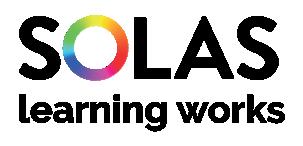
“We offer courses that help people learn new skills to enable them to progress in their career, change careers or re-enter work after a break,” explains Ní Fhloinn. “It’s about helping people re-integrate into a learning space in a way they feel comfortable.” This includes a suite of IT courses, remote working support and courses on teamwork and office productivity.
With companies increasingly availing of FET and recognising the opportunities it provides for staff development, Ireland is beginning to plug the skills gap and, at the same time, arm its population with a lifelong commitment to learning.
Flexibility is key for employees taking part in learning, for example, being able to do it in the evening.Ciara Ní Fhloinn Flexible Learning Manager, Enterprise Employment and Skills, SOLAS, The Further Education and Training Authority WRITTEN BY James Martin Minister Dara Calleary Department of Enterprise, Trade & Employment (DETE)
Entrepreneurship is the creative capacity to identify an opportunity and pursue it to produce new value or economic success. It is key to the health and wellbeing of any thriving economy but particularly Ireland, where we have such a strong SME landscape.
Entrepreneurship is vital to the Irish economy. SMEs make up over 99% of the total number of Irish companies, employing hundreds of thousands of people and are instrumental in driving regional development and economic growth.
Giving entrepreneurs room to grow
The White Paper on Enterprise is the cornerstone of our enterprise policy providing a framework that is focused on accelerating startup growth and scaling — including access to public and private funding, investment in research and development, access to skills, an appropriate regulatory environment and a tax system that encourages investment in startups and scaling.
The 2021 Report of the Taskforce, an SME and Entrepreneurship Growth Plan is the strategic blueprint for SMEs and entrepreneurs to start up, scale up and access foreign markets, as well as help them navigate the transition to a low-carbon, digital economy.
Providing the necessary support
We know innovative businesses require risk capital (ie. equity) to help fund their growth. The private equity investment market has grown significantly. However, there are sections of the market that are still in need of intervention, primarily seed/startup and scale-up. The State, through Enterprise Ireland and

Lunchtime yoga, wellbeing apps, free food — keep them. But to really improve workplace mental health, make small changes to the structure and culture.
the Ireland Strategic Investment Fund, is a significant player at the early stage of the investment cycle through the Seed and Venture Capital Scheme and the Innovation Seed Fund.
My Department also plays an important role in mitigating global issues that impact indigenous enterprises by developing and implementing appropriate financing and contingency support.
Similarly, Enterprise Ireland and the Local Enterprise Office are important levers for growth and support in our enterprise ecosystem. Enterprise Ireland’s strategy sets out an ambition for Ireland to be a world-leading location to start and scale a business, with a target of a 20% increase in the number of high-potential startups by 2024.
Both the White Paper and the SME and Entrepreneurship Growth Plan recognise the expanding role of LEOs as a first stop-shop for guidance, financial assistance, mentoring and training for anyone intending to start or grow a business.
My Department, along with Enterprise Ireland, is currently exploring options for long-term strategic funding to accelerate scaling. We must ensure our enterprise ecosystem is dynamic and responsive to challenges, so businesses are supported to seize opportunities.
Organisations want to support employees’ mental health. Most organisations are already trying. However, the latest research suggests we’re putting our efforts into the wrong place.
Well-meaning ‘bad prescriptions’ for mental health

A 2023 study from Oxford University’s Wellbeing Research Centre says that the danger is in treating employee wellbeing as though it is isolated from working conditions. These ‘bad prescriptions’ seek to change the individual, not the organisation.
That’s not to say we shouldn’t keep our lunchtime yoga and Employee Assistance Programmes (EAPs). They show employees we value them, but they’re firefighting issues rather than creating a healthy workplace that prevents issues from arising in the first place.
Good workplace and bad workplace
What does a healthy workplace look like? Employees have identified job satisfaction, a positive emotional experience and finding work purposeful, worthwhile and meaningful as essential. They want to be clear on their responsibilities, have some flexibility, be trained right for the demands of the role, be consulted on the decisions that affect them, have some autonomy in their day-to-day work and be treated fairly.
In terms of what makes a workplace ‘unhealthy,’ bullying and the tolerance of bullying are chronically destructive. Unrealistic time pressures, micro-management, a lack of consistency in how policies are applied and people being denied credit where it is due all come up as negatively impacting the workplace.
Start with the employees themselves Employees are the most reliable source of information on workplace culture. They can tell you immediately what structures are the most challenging. They can help you design solutions to increase the wellbeing of the organisation. A workplace where sharing ideas is the norm helps employees feel valued — and it’s free.
Workplace policies are commitments to staff. Mental Health Ireland recommends creating a workplace mental health policy. For your staff — with your staff. In their recently launched framework, ‘Wellness Works,’ Mental Health Ireland guides organisations through this process step by step. Worthwhile change doesn’t necessarily cost a huge amount financially. It does require an investment by management and leadership in working with employees to make changes that matter. The ultimate payoff from this investment is a healthier workforce, staff retention, a decrease in absenteeism due to mental health challenges, lower risk to the organisation’s reputation and a culture that you are proud to have contributed to creating.
Learn more at mentalhealthireland.ie/ workplace-wellbeing_framework/

mental health: does the worker or the workplace need to change?Miriam Barrow Researcher, Mental Health Ireland
SMEs make up over 99% of the total number of Irish companies, employing hundreds of thousands of people.